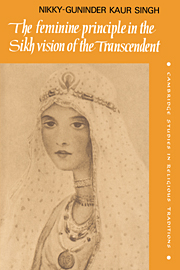Book contents
- Frontmatter
- Contents
- Preface
- Introduction
- 1 The Primal Paradox: seeing the Transcendent
- 2 Mother: the Infinite Matrix
- 3 The bride seeks her Groom: an epiphany of interconnections
- 4 Durgā recalled: transition from mythos to ethos
- 5 The maiden weaves: garlands of songs and waves
- 6 The woman asks: “What is life?”
- 7 Suṅdarī: the paradigm of Sikh ethics
- 8 Rāṇī Rāj Kaur: the mystical journey
- Conclusion
- Epilogue
- Notes
- Bibliography
- Index
Conclusion
Published online by Cambridge University Press: 07 October 2009
- Frontmatter
- Contents
- Preface
- Introduction
- 1 The Primal Paradox: seeing the Transcendent
- 2 Mother: the Infinite Matrix
- 3 The bride seeks her Groom: an epiphany of interconnections
- 4 Durgā recalled: transition from mythos to ethos
- 5 The maiden weaves: garlands of songs and waves
- 6 The woman asks: “What is life?”
- 7 Suṅdarī: the paradigm of Sikh ethics
- 8 Rāṇī Rāj Kaur: the mystical journey
- Conclusion
- Epilogue
- Notes
- Bibliography
- Index
Summary
Our journey through the three different phases of Sikh literary history – scriptural, transitional, and secular – illustrates the primacy of the feminine principle. To begin with the scriptural phase, we find that it illustrates this paramountcy in the very phenomenon of envisioning the Transcendent, in the subject of the vision itself, as well as in the individual process of revisioning the Formless Reality. What I wish to reiterate is, first of all, that the Sikh vision of the Transcendent One has its genesis in Gurū Nānak's experience – a most physical and sensual seeing into the Being and Nature of Reality. The method of the first Sikh prophet bypasses the androcentric approach, for it dissolves all kinds of patriarchal oppositions and hierarchies between the mind and the senses, man and nature. The holding of the cup of ambrosia and drinking it were in Gurū Nānak's vision synthesized with hearing the divine call and with seeing the oneness and unity of the cosmos, nature, and humanity; the heightened aesthetic experience led him to an exhaustive knowledge of the ontological reality. Indeed his epiphanic encounter with the Divine was in terms of process and movement, which feminists have long recognized as being central to women's experience. Furthermore, Gurū Nānak made spontaneous poetry rather than abstract theorizing the medium of celebrating what he saw, as he saw it. A joyous and holistic experience, it was Gurū Nānak's and Gurū Nānak's alone.
- Type
- Chapter
- Information
- The Feminine Principle in the Sikh Vision of the Transcendent , pp. 242 - 251Publisher: Cambridge University PressPrint publication year: 1993



